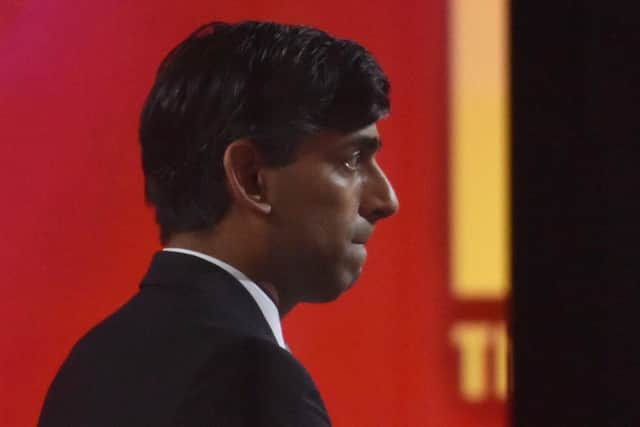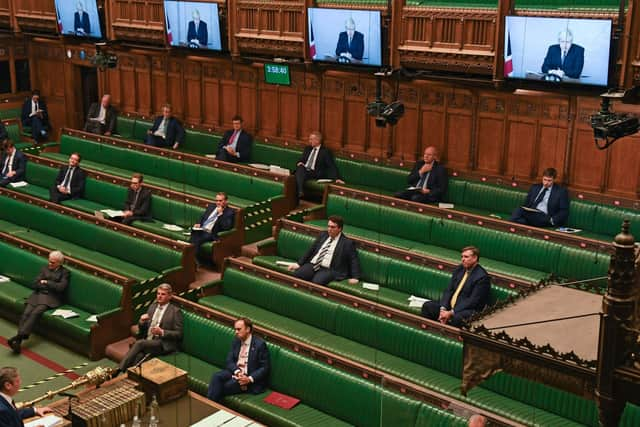Parliament must now guarantee value for money after Spending Review – Danielle Boxall


It’s hard to believe it was only a year since Boris was hiding in fridges in Pudsey, our now Chancellor was a rising star in the TV debates, and the Tories were setting out their manifesto with the promise of a Black Friday-style spending spree.
Even though Covid has sent shockwaves through the economy and torn apart the public finances, the Chancellor tried to hark back to those days of big spending promises. Billions of taxpayers’ money were pledged. There was a deluge of data and announcements, but what about outcomes? Will the money promised be spent wisely?
Advertisement
Hide AdAdvertisement
Hide AdRegrettably, we won’t know the answer to that question because government spending plans aren’t actually properly scrutinised for their value for money ahead of the cheques going out.


That’s why the TaxPayers’ Alliance is proposing a new Parliamentary Budget Committee, allowing Parliament to play a greater role in getting government to focus on efficient spending.
Of course, getting maximum value for every penny of taxpayers’ money has always been important. Even before the pandemic, the pressure on public spending was intensifying.
In 2017, the Office for Budget Responsibility’s Fiscal Sustainability Report forecast that spending on healthcare would be £88bn higher, in real terms, by 2066. That increase alone is over twice last year’s total defence budget.
Advertisement
Hide AdAdvertisement
Hide AdTake into account the Conservatives’ manifesto pledges – the 20,000 more police officers, the maintenance of some form of triple-lock pensions and the 250,000 extra childcare places certainly won’t come cheap.


Add to that the enormous sums of money spent in coronavirus response, plenty of which has been shamefully and catastrophically wasted by the Tories. With the biggest deficit since the Second World War and the worst recession in Europe, we cannot afford any inefficient or wasteful spending. Every penny has to be spent well.
There are already bodies which analyse public sector spending – the OBR and the Treasury Select Committee do sterling work. The OBR’s reports give taxpayers the chance to look at the big picture, and the committee scrutinises spending in terms of fiscal aggregates.
But while they may point out the long term impact of low productivity growth in the NHS for example, they don’t have the mandate or resources to compare it to other healthcare models or deep-dive into what might be causing it. And departmental select committees are simply too busy
Advertisement
Hide AdAdvertisement
Hide AdInstead of piling more pressure on these bodies, a Parliamentary Budget Committee (like the examples in Australia and New Zealand) offers an opportunity to scrutinise the effectiveness and efficiency aspects of future spending plans.
The key word here is ‘future’. We do have the Public Accounts Committee, which does a first-rate job at examining the value for money of government projects, but they only spring into action after taxpayer money has already been spent.
Unlike with the Black Friday sales, the Government can’t return the projects it’s already paid for when it turns out they’re not good value for money.
A dedicated Parliamentary Budget Committee would focus each department’s expenditure plans on efficiency before they reach into the public purse.
Advertisement
Hide AdAdvertisement
Hide AdNot only would it stop extraneous spending in its tracks, but the committee would free up valuable time for other departmental committees by advising them where to investigate.
Given that long-term borrowing is so cheap at the moment and we’re still in the midst of the pandemic, this might feel like an issue for another day. But there’s a dangerous complacency brewing in Westminster circles and the more comfortable we get with it, the less people will care about getting value for money.
With the long term health of our economy at risk, the Government must work harder to make sure every pound of taxpayers’ cash is money well spent, and a Parliamentary Budget Committee can help them do that.
Rishi Sunak should remember: never put off until tomorrow what you can do today.
Advertisement
Hide AdAdvertisement
Hide AdDanielle Boxall is Media Campaign Manager at the TaxPayers’ Alliance. She has a degree in History and Politics from the University of York.
Support The Yorkshire Post and become a subscriber today. Your subscription will help us to continue to bring quality news to the people of Yorkshire. In return, you’ll see fewer ads on site, get free access to our app and receive exclusive members-only offers. Click here to subscribe.
Comment Guidelines
National World encourages reader discussion on our stories. User feedback, insights and back-and-forth exchanges add a rich layer of context to reporting. Please review our Community Guidelines before commenting.